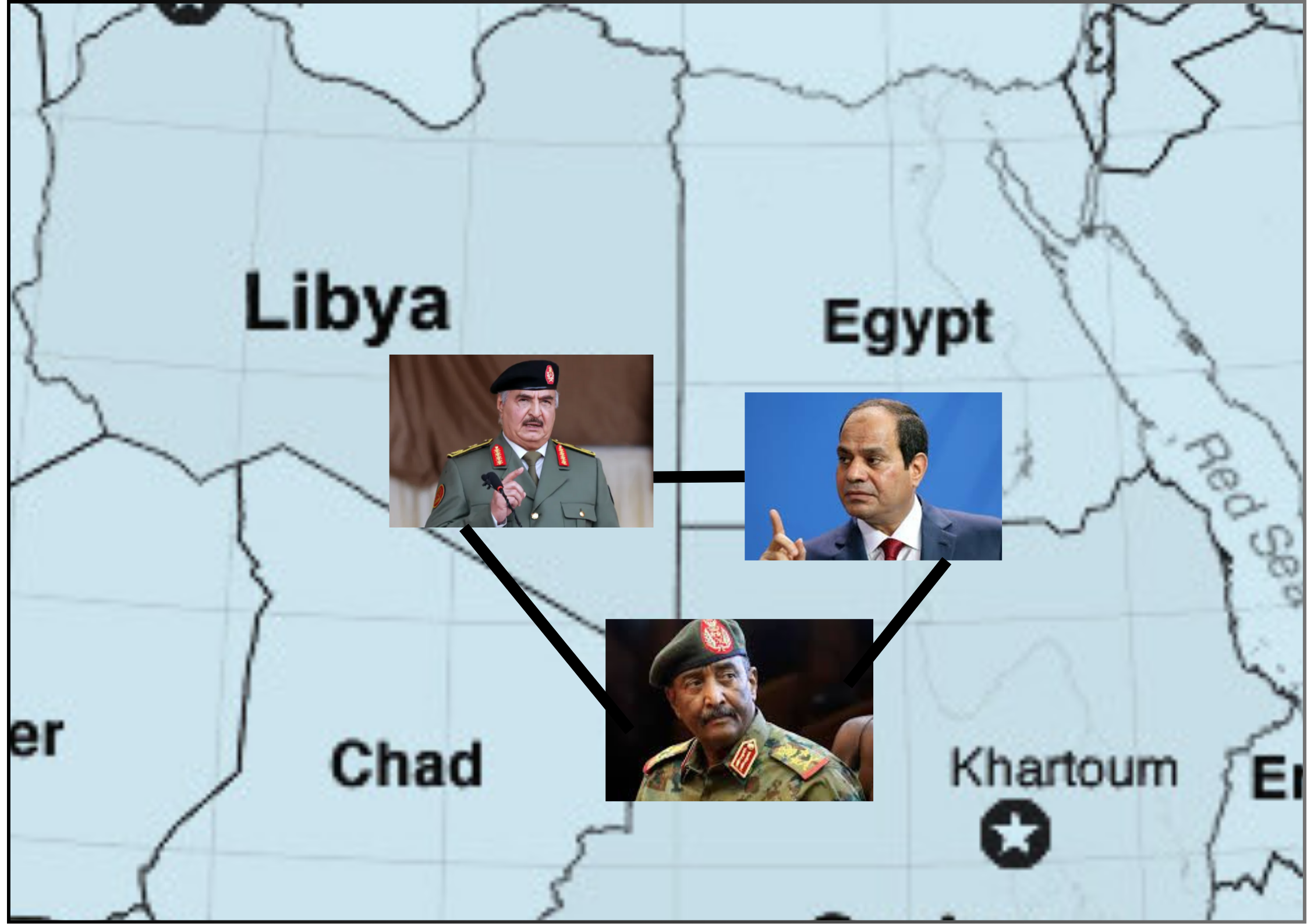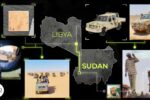Fears and deals: Inside the Sudan-Egypt-Libya border triangle
7 August 2025
When the Rapid Support Forces (RSF) seized control of the Uwaynat Triangle, a strategically important border crossing between Sudan, Egypt, and Libya, it upset a complex network of alliances among the three countries. A series of high-level meetings took place in Cairo in June and July to address the fears and concerns of each party.
An Egyptian-Emirati alliance supports the Libyan army led by retired General Khalifa Haftar. In turn, Haftar and the United Arab Emirates (UAE) support the RSF, while Cairo stands with the Sudanese army.
On June 4, a week before the RSF invaded the border triangle, the Egyptian president, Abdel Fattah el-Sisi, met with the United Arab Emirates (UAE) president, Sheikh Mohammed bin Zayed, in Egypt, where they discussed the Sudanese conflict.
On June 30, Sisi met with General Khalifa Haftar and his sons Saddam and Khaled in the Egyptian city of El Alamein. They discussed the situation in Libya, as its stability is an integral part of Egypt’s national security, according to a statement from the Egyptian presidency.
Sisi organised a July meeting in Egypt to ease tensions between the Sudanese army and General Khalifa Haftar, who was accused by the army of supporting the RSF, with the Chairman of Sudan’s Sovereignty Council, Abdel Fattah al-Burhan, also in attendance. During the tense meeting, Haftar denied the claim of supporting the RSF, and the two leaders did not reach an agreement regarding border security, according to a source close to the Sudanese army who requested anonymity.
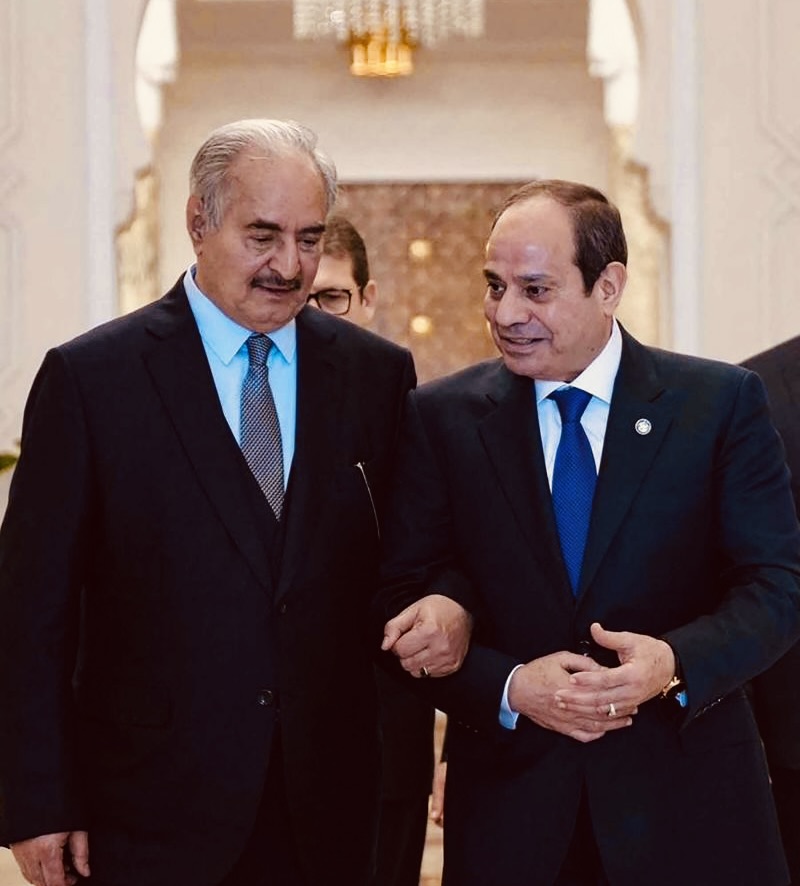
A balancing act
The military source stated that Egypt promised Burhan that the RSF would not use the border triangle as a launching pad to attack and seize control of the Northern State, one of the Sudanese army’s greatest concerns.
“The Rapid Support Forces will benefit from the strategic dimension of the border triangle to deliver supplies to its forces in the Darfur and Kordofan regions and will not be able to attack the Northern State in northern Sudan,” Egypt’s National Security and Foreign Relations Advisor, Major General Mohamed Abdel Wahid, told Ayin.
Major-General Abdul Wahid pointed out that the ongoing consultations between the three parties in Cairo aim to find diplomatic solutions to the highly sensitive border triangle issue and reach an understanding to ensure that their interests are not compromised amid their conflicting alliances.
“Egypt seeks regional stability and the protection of its interests and national security. It supports retired General Khalifa Haftar in eastern Libya because he represents a defensive line on its western borders. It also supports the Sudanese army because it views its downfall as a collapse of the Sudanese state. At the same time, it maintains strategic bilateral relations with the UAE.”
Abdul Wahid said that this complex situation put Cairo in a difficult position. Egypt has been reluctant to speak out too much, lest it provoke misunderstandings from its allies, the UAE, and General Khalifa Haftar.
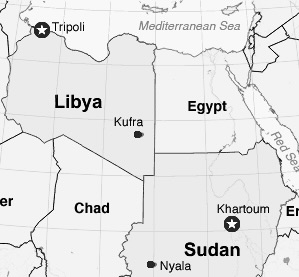
A remote, strategic location
The Uwaynat Triangle is of strategic importance. Despite its location in the middle of a barren desert, it serves as a vital link for trade and economic activity between Sudan, Egypt, and Libya. It is also rich in resources, particularly gold, and includes dozens of mines for manual gold prospecting. However, there are no organised gold mining companies operating there.
A large market established by traditional miners in the triangle region is located approximately 350 kilometres from the Libyan city of Kufra and 25 kilometres from the Egyptian border. The closest Sudanese city to the triangle is Al-Khanaq, which is approximately 550 kilometres away.
For the first time since the outbreak of war in Sudan, during a speech on June 22, RSF Commander Mohamed Hamdan Dagalo (“Hemedti”) spoke positively about Cairo, after having repeatedly attacked it in the past – accusing Egypt of supporting the Sudanese army and attacking his forces. “Our problems with Egypt are caused by these criminals”—referring to the army—“and we have reviewed our calculations and must resolve our problems with Egypt through dialogue, at the negotiating table, not through bickering.”
The RSF leader went further, offering to transform the triangle into a trade and economic integration zone between Sudan, Egypt, and Libya, in a major reversal of its stance toward Cairo.
Yet the Sudanese army is troubled by the RSF’s new logistical support outlets, as the army has determined that they must cut off the RSF supply lines to defeat them, sources within the military told Ayin.
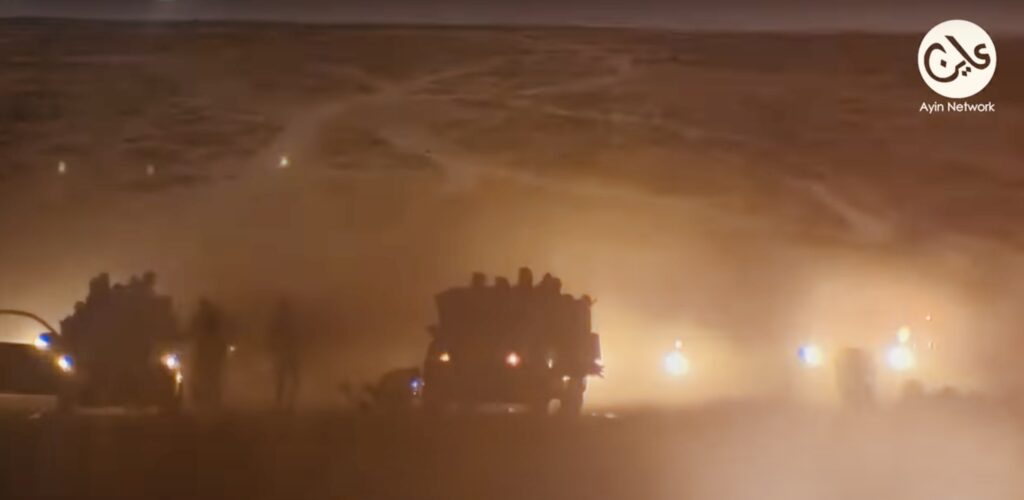
Sovereign importance
“The army was able to neutralise Nyala Airport, the largest air supply line for the Rapid Support Forces, but the triangle has caused tremendous confusion, and the armed forces have no choice but to resolve it militarily,” a military source told Ayin. This, however, will not start immediately, the source said, since the army is focusing its military efforts on the Kordofan states.
“[The triangle] does not currently represent military value or importance compared to other cities and state capitals in Darfur and Kordofan,” said retired Major General Moatsem Abdel Qader. “But it does have sovereign value for the army and a psychological dimension for the Rapid Support Forces, which seek to use it to assert their ability to reach areas beyond Darfur, as well as the Egyptian border and the Northern and River Nile states.”
Abdel Qader added that the groups supporting the RSF in the triangle have a Salafi orientation, and the region could become a haven for Salafi groups, particularly the so-called Hasm movement, which is hostile to the Egyptian government.
“It is clear that Egypt’s actions have prompted the Libyan groups allied with Haftar to withdraw their support for the Rapid Support Forces’ incursion into Sudan, particularly the Northern State, contrary to what the Rapid Support Forces had anticipated and planned,” the retired general told Ayin. “Without Libyan support, the Rapid Support Forces would be unable to advance toward the North, as their supply lines would be completely cut off and their backs would be exposed.”
Through the RSF’s calls for commercial and economic integration in the triangle, it appears that they are planning to establish an economic foothold in the region. A source within the RSF told Ayin that the RSF offered Cairo permission to export agricultural and animal products from Kordofan and Darfur to it, after they had previously stopped them, and to guarantee all their interests, in exchange for blessing their presence in the triangle and cooperation around it.
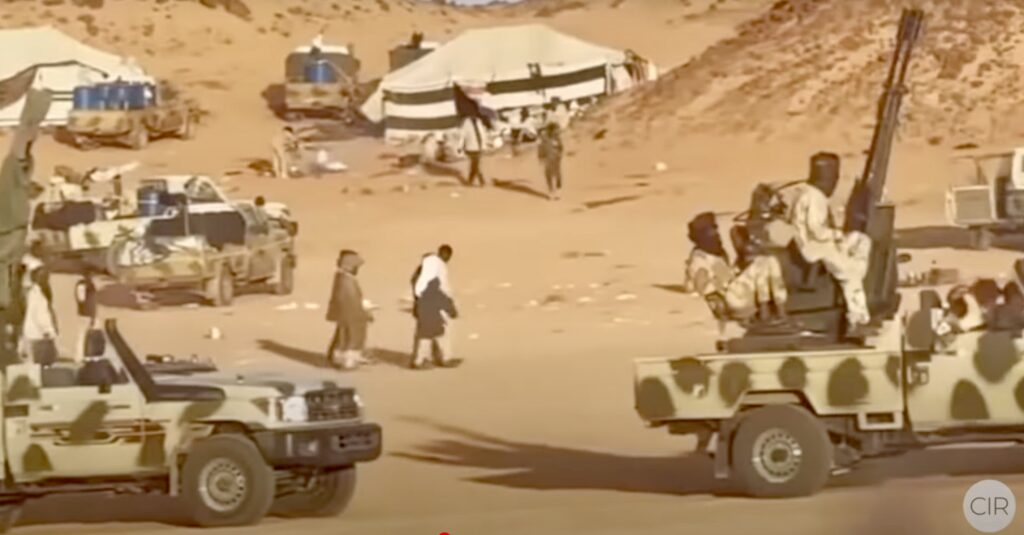
Security concerns: Egypt on high alert
But Cairo’s position goes beyond economic considerations, including major security concerns since the RSF is close to its borders, according to Mohamed Abdel Wahid.
“Haftar wants to exploit the triangle for smuggling operations and economic gains, while Hemedti wants to secure supply lines for his forces in Kordofan and Darfur and launch an offensive toward the Northern State,” Abdel Wahid said. Egypt is in a precarious situation, the security advisor added, since untrained RSF soldiers, linked to mercenaries and others, now roam this border region.
“Egypt is capable of military intervention in Libya and Sudan, but it does not want to. It is now working to exert diplomatic pressure on Haftar to stop supporting the Rapid Support Forces and on Hemedti to de-escalate the situation.”
According to political analyst Abu Dhar Ali Al-Amin, Egypt will never accept the RSF within the triangle, despite their close relations with the RSF’s supporters, the United Arab Emirates. “We do not expect any developments in Cairo’s position on the Sudanese issue, as it does not accept any change in an equation that strengthens the role of the Rapid Support Forces, which has an alliance with Ethiopia, which also poses a threat to its national security.”


